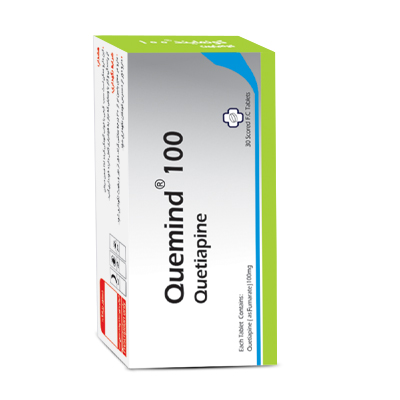Description
What is Quetiapine and how does it work in the body?
Quetiapine is an atypical antipsychotic drug approved by the Food and Drug Administration for the treatment of schizophrenia, bipolar depression, and major depression. It acts by affecting the central nervous system. This drug is produced under the brand name Quemind by Kish Medipharm Pharmaceutical Group in doses of Quemind 25, Quemind 100, Quemind 150, and Quemind 200.
Quetiapine is produced in tablet form and is a prescription drug. Due to the side effects it can have, it should never be taken without a doctor's prescription or the dosage should not be changed arbitrarily. Quetiapine may be used as a combination therapy, i.e., prescribed with other pills, or as a monotherapy recommended by a doctor.
Quetiapine is one of the best known drug treatments, prescribed and used even for children aged 10 to 17 to control the manic episodes caused by bipolar disorder. This drug controls the condition by regulating the amount of dopamine, norepinephrine, and serotonin in the brain.
Uses of Quemind tablets
The method and cases of using Quemind tablets depend on the diagnosis of a specialist physician, including the conditions that are considered when prescribing this drug: age, severity of the disease, physical health status, medications being taken, and reaction to the first dose. The prescription cases are based on FDA approval & OFF LABEL USE, which we will mention below.
The following are the indications for prescribing quetiapine approved by the Food and Drug Administration:
- Schizophrenia (confirmed in 2007)
- Bipolar disorder in the manic phase (confirmed in 2008)
- Bipolar disorder with depressive episodes (confirmed in 2008)
- Bipolar disorder and maintenance treatment (approved in 2008)
- Major depressive disorder (quetiapine extended-release, approved in 2009)
Other indications for quetiapine:
- Generalized anxiety disorder (with antidepressants)
- Alcohol dependence
- Insomnia
- Psychosis, restlessness associated with Alzheimer's dementia
- Psychosis in Parkinson's-related patients
- Maintenance treatment for schizophrenia
- Post-traumatic anxiety disorder (in combination with antidepressants or monotherapy)
- Adjunctive therapy with SSRIs for obsessive-compulsive disorder
- Borderline Personality Disorder (BPD)
- Restlessness and delirium in patients admitted to the ICU
Tips on taking Quemind
If a specialist doctor diagnoses the use of Co-Mind, it is necessary to consider the important points regarding this drug. Below are some of these points:
- The maximum daily dose is 800 mg, depending on the doctor's diagnosis.
- Quetiapine is a long-term medication. Avoid stopping this medication on your own.
- Sudden discontinuation of Quetiapine may cause drowsiness or nausea and vomiting.
- Store Quemind at a temperature of 15-30 degrees and in a dry place.
- While taking quetiapine, monitor your blood sugar, cholesterol, weight, and thyroid hormone levels.
- The drowsiness caused by taking quetiapine disappears after a few days or even a few weeks.
Quetiapine side effects
Despite its many benefits in mood control, quetiapine can have numerous side effects, some of which are irreversible, so it should be recommended and prescribed under the supervision of a specialist. Below are some of the side effects of quetiapine:
- Drowsiness
- Dry mouth
- Dizziness
- Constipation
- Nausea
- Skin rash
- Itching
- Hot flashes
- Stomach problems
Quetiapine can also cause weight gain and increased appetite due to the changes it causes in the body's hormonal system and metabolism. To manage this, it can be prevented by increasing physical activity, changing lifestyle, and diet.
Drug interactions of quetiapine tablets with other drugs
Quetiapine may interact with other medications or vitamins, which can increase the risk of side effects or make them less effective. So be sure to tell your doctor about all herbal or over-the-counter medications you are taking. Below is a list of medications that may interact with quetiapine.
- Antiarrhythmic drugs such as sotalol, amiodarone, and procainamide
- Antipsychotic medications such as chlorpromazine, thioridazine, and ziprasidone
- Antibiotics such as methadone, pentamidine, gatifloxacin, and multifloxacin
- Benzodiazepines such as alprazolam, diazepam, and clonazepam, and antihistamines such as chlorpheniramine and diphenhydramine, can cause increased drowsiness if used concomitantly with quetiapine.
Quetiapine interactions and warnings for people with certain medical conditions
In addition to the side effects it can cause, taking quetiapine can have dangerous and different side effects depending on the specific physical conditions of individuals. Below, we will examine some of these.
- Given that quetiapine poses a risk of high blood sugar in people with diabetes, the drug should be used with extra caution under the supervision of a specialist, so that blood sugar levels are checked before and after taking quetiapine. This complication can even cause coma or death.
- People with hyperlipidemia (high blood fat levels) are at higher risk of stroke and heart attack because quetiapine can raise blood fat levels. It is important to have your triglyceride and cholesterol levels checked by a doctor before starting quetiapine.
- Quetiapine can reduce thyroid hormone levels, so it may pose risks for people with thyroid disease.
- Patients who have arrhythmia (abnormal heart rhythm) are at greater risk of arrhythmia when taking quetiapine.
Frequently asked questions about quetiapine
In this section, we will review the most common questions about quetiapine.
Does quetiapine cause dependence and addiction?
Quetiapine is generally not addictive, but its continuous use outside the control of a specialist can cause dependence.
How long does it take for quetiapine to work in the body?
The time it takes for Quetiapine to take effect varies from person to person, but results can usually be seen within 2-4 weeks, although it should be taken for 6-8 weeks to achieve optimal results.
Can taking quetiapine cause weight gain?
Yes, due to the changes it makes in the body's metabolism, it can cause weight gain in some people.
Is quetiapine suitable for everyone?
No, it may not be suitable for people with certain physical conditions. For example, people with kidney and heart disorders should take this medication with more caution.







Reviews
There are no reviews yet.